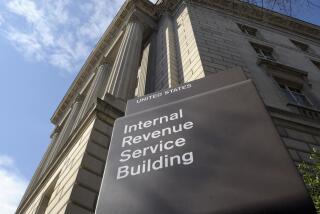Adding up tax deductions on business trips
When it comes to life’s two guarantees, I find death less scary than taxes. Taxes, in fact, are so scary that they make me want alcohol. So is a margarita on a business trip as deductible as my hotel room?
Sadly, no. That margarita is typically only 50% deductible. Hotel room and airfare generally are 100% deductible — if they are unreimbursed expenses and the trip is primarily for business (at least 51% of it).
As you sit down to do your taxes, think of this wisdom from Raphael Tulino, an Internal Revenue Service spokesman for Southern California: “Depending on facts and circumstances, there are many ordinary, necessary and reasonable business travel expenses you can deduct, and you should take them if legitimate.”
But John Stoller, a former IRS agent, tax attorney and a certified public accountant, says that it’s not always black and white. “It’s a somewhat subjective call in determining whether a trip qualifies,” he says. “If your primary purpose is for a business reason, then you can probably get the deduction. If the business portion is only secondary, then only the direct business expenses are deductible and not the cost of the trip.
“If …your primary reason for going to Orlando is to do an article about Disney World, your trip should be deductible. If you should meet your brother there for a dinner, then that dinner would not be deductible, but the trip still is.”
Whatever you do, be sure you document it. “It’s a good idea to keep a paper trail of all your expenses as substantiation for what you put on your tax return,” Tulino says. He recommends consulting Publication 463 (“Travel, Entertainment, Gift and Car Expenses”).
I also consulted Topic 511 (“Business Travel Expenses”) and turned again to Stoller for more insight on the documentation. “With travel deductions, you must prove you spent the money, paid for hotel, food and transportation and have receipts for whatever money you spend,” Stoller says.
Here are some other travel-related expenses to consider:
Conventions: The convention must be ordinary and necessary to improve or promote your business, so save supporting documents (brochures and correspondence) along with receipts. For example, if you are a chiropractor and attend a proctology convention because a patient who is a proctologist wants all his colleagues to become your patients, if you can provide e-mails and proof that attending the convention in a different field was primarily for business development, you could deduct it.
Business travel at holidays: Deducting a Christmas or Thanksgiving trip can raise a red flag for the IRS, Stoller notes. Save letters or e-mails that demonstrate the trip was primarily for business rather than sipping eggnog with family.
Transportation: Travel by airplane, train, bus or car between your home and your business destination is usually deductible. You can’t write off a free ticket (whether it was a gift or earned through a frequent traveler program), but you can deduct any fees paid to get the ticket issued.
Car maintenance/operating expenses when traveling on business: You can choose to deduct actual expenses or the standard mileage rate, whichever is greater. For actual expenses, you calculate the percentage of business miles driven for the tax year. If 51% of your mileage was for business, 51% of your automobile fuel, maintenance and insurance costs that year are deductible. Or you can just multiply business miles by the standard mileage rate for the year. In 2009, it was 55 cents per business mile; for 2010, it’s 50 cents per mile. Commuting to and from work generally isn’t deductible for employees, but it generally is for independent contractors who maintain an office in their home.
Car rental expenses: You can deduct business-use part only. If two days of a seven-day car rental are spent sightseeing (personal), only five days are deductible.
Other costs that may be deductible:
Transportation between the airport, bus or rail station and your hotel, and the hotel and work location of your customers/clients, your business-meeting place, or your temporary work location.
Sending baggage and business materials between your regular and temporary work locations.
Lodging and meals if your business trip is overnight (or long enough that you require sleep to properly perform your duties). Meals include amounts spent for food, beverages, taxes and related tips and are 50% deductible for individuals and 100% deductible for employers reimbursing the meal. Cost of meal is considered to include tax and tip.
Dry cleaning and laundry, if reasonable. “If you fly to Sacramento and spill coffee on your suit on the flight, you could deduct the cost of getting the jacket dry cleaned before your meeting,” Stoller says. “It’s not reasonable, however, to pack a month’s worth of dirty laundry to get it dry cleaned during a business trip.”
More to Read
Sign up for The Wild
We’ll help you find the best places to hike, bike and run, as well as the perfect silent spots for meditation and yoga.
You may occasionally receive promotional content from the Los Angeles Times.






